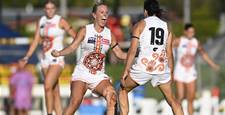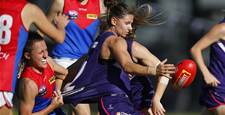In just under two weeks, the Matildas final squad for their first Olympics in 12 years will be announced.
In just under two weeks, the Matildas final squad for their first Olympics in 12 years will be announced.
Much like the FIFA Women's World Cup, the Olympic Football Tournament is an open age competition on the women's side.
However, instead of 23 player squads, the Olympic roster is restricted to 18 players plus four alternate players.
What is the makeup of the roster?
The roster makeup for the Olympics is set at 16 outfield players and two designated goalkeepers.
Each of those players are assigned numbers 1 – 18 only. Therefore players like Katrina Gorry (usually #19) and Michelle Heyman (usually #23) could possibly be donning unfamiliar numbers in Rio.
What is an alternate player?
An alternate player is a player who is not officially in the roster and so is not be allowed to play. Alternate players will have the numbers 19 to 22.
"The purpose of selecting alternate players is, in principle, to have them available should one or more of the officially enrolled players sustain an injury or in the case of force majeure once the final competitions have started" - FIFA Regulations
However, an alternate player can be added to the official roster in the event of injury or illness once the tournament has started, in accordance with the IOC's Late Athlete Replacement Policy (LARP).
Alen Stajcic has previously stated that Australia will only be selecting two alternate players to travel with the team to Brazil.
[MORE: Matildas Rio roster shaping up | Ellie Carpenter: Earning moments | Rio 2016 Coverage]
When can an alternate player be used?
From 16 July 2016, the Matildas will become a part of the Australian Olympic Team. While Stajcic nominates his players, it is the AOC who registers athletes for the Olympic. The deadline to register athletes is 18 July 2016. After this date, athletes can only be replaced under the LARP.
An alternate can only be used if, after 19 July 2016, a roster player:
(a) sustains a serious injury; or
(b) becomes so ill that she cannot compete.
The team doctor must provide a medical certificate to verify the illness or injury and a independent FIFA Medical Committee has to sign off.
What about replacements after the first match of the tournament?
Unlike the World Cup, players can be replaced at any time during the Olympics, provided they are unable to play for the reasons above.
Can the roster player return after their position is filled?
No. Once a roster player is replaced by an alternate player, the roster player's tournament is over.
Can you have an alternate for an alternate?
No. Once an alternate player is placed on the official roster, that empty alternate player slot can't be filled.
Source: FIFA Regulations for the Olympic Football Tournaments
Related Articles

Aussies Abroad: Dub champions gutted, ribbons Raso on the move, and transfers, transfers, transfers

New FA Chief Football Officer to 'disrupt' Australian game













